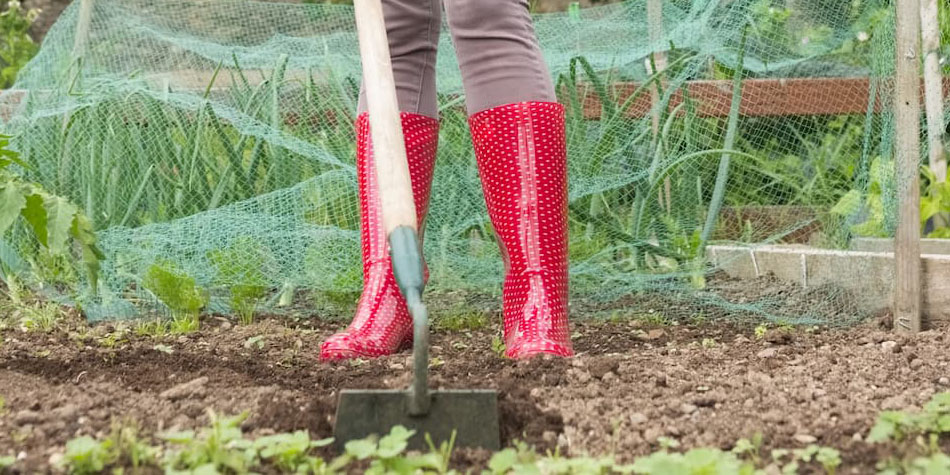
The health benefits of gardening include improved muscle strength, flexibility and heart health, as well as better overall well-being and quality of life.
There's good news for the 55% of American households that maintain a garden. In addition to fresh air, access to fresh produce and potentially increased property values, there are several health benefits from gardening that individuals with green thumbs can enjoy.
Gardening can improve your muscle strength, flexibility and even heart health. It can also lead to increased feelings of well-being and a better quality of life. National Gardening Exercise Day is June 6, but you can reap the following five health benefits of gardening throughout the growing season.
1. Enhanced physical health
Anyone who has spent hours planting, weeding, digging and mowing knows that it can be a workout. Gardening is a great, low-impact exercise that uses many muscles. This can make you stronger and help prevent chronic disease. And as a related benefit, the healthy foods you can grow are full of nutrients your body needs to stay healthy.
Planting seeds or pulling weeds requires squatting, which uses the muscles in your legs along with your back and core muscles. Building these muscles helps improve balance, which is why squats have been called the top exercise for people as they age. Hauling bags of mulch uses muscles in your legs, arms and back. Prepping the grass for seeding or pushing the lawn mower also involves your whole body.
In fact, gardening can provide a full-body exercise, similar to what you might get at the gym. The Centers for Disease Control and Prevention says 30 minutes of gardening and yard work can burn 165 to 220 calories, which is about the same as weight training.
This physical activity leads to many health benefits, including:
- Stronger bones and muscles
- Reduced risk of chronic diseases, like high blood pressure, heart disease, Type 2 diabetes and osteoporosis
- Reduced risk of some forms of cancer
- Healthy weight management
- Reduced pain from arthritis and other conditions
2. Reduced stress
Spending time outdoors — and away from screens — provides a break from common everyday stressors, which can help improve mental health. Studies show that spending time in nature can significantly reduce stress and anxiety.
Combined with the feelings of satisfaction and accomplishment that cultivating new life offers, gardening can be a great way to unwind. It allows you to be creative and constructive, all while staying active. As an added health benefit, this type of exercise can help you fight depression and protect against cognitive decline and dementia.
3. Enhanced mood
In addition to reducing stress and fatigue, spending time outdoors has been found to significantly improve mood. The boost in energy that you experience continues long after you go back indoors.
Research has found that spending time outside can encourage relaxation and allow people to focus more easily. Observing other types of living organisms — such as birds and plants — can also lead to an improved mood. All of this can positively impact your well-being and quality of life.
4. Increased vitamin D production and fiber intake
Gardening can lead to increased vitamin D levels, which can enhance your immune function. With increased exposure to sunlight, the body can make more vitamin D, which is a nutrient the body needs for strong bones and a healthy immune system. This is important because many people don't get enough vitamin D from the food they eat.
That said, it's important to take sun exposure seriously. It's best to avoid being out in the sun between the hours of 10 a.m. and 2 p.m., and you should always use sunscreen with an SPF of 30 or higher.
Another benefit from gardening comes from the fruits and vegetables that many gardeners grow. People who garden may eat more fiber, which is very important for overall health and disease prevention.
5. Strengthened social connections
Finally, gardening can be a route to increased social connection. Neighbors often connect over their love of gardening, lending each other tools, trading plant materials and tending to each other's crops when need be.
For instance, many neighborhoods have community gardens where residents work together to plant and grow flowers and vegetables. Many parks have volunteer days where people of all ages come together to weed and garden while caring for the environment.
Getting your exercise in the garden
Given all the health benefits of gardening outlined above, you can go ahead and skip the gym — and work out in the backyard instead. This fun outdoor activity plays a role in what you do with your body and what you put in your body, all while enhancing your overall well-being.
Take some time to warm up. Do some stretches to make sure your muscles are ready to work and reduce the risk of injury. This way, you can safely and easily reap all the health benefits of gardening while enjoying your time outside.
$webqFacilityNumber
Need a Physician?